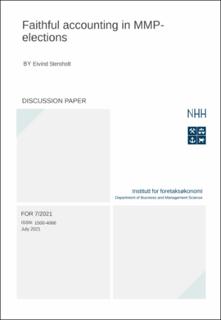Faithful accounting in MMP-elections
Working paper

Åpne
Permanent lenke
https://hdl.handle.net/11250/2764395Utgivelsesdato
2021-07-14Metadata
Vis full innførselSamlinger
- Discussion papers (FOR) [566]
Sammendrag
In MMP-elections for legislatures, political parties compete for a voter’s support in two ways: for a first vote to the party’s candidate in a single-seat constituency and for a second vote to the party’s list of candidates. To obtain party representation proportional to the second votes, a nationwide second vote tally compensates with list seats to parties with a sub-proportional number of constituency seats.
The German Bundestag has 299 constituency seats, and 299 list seats is the legal norm, but it got 410 list seats in the 2017 election. This deviation also violates a principle, stated by the federal constitutional court, that voters have equal influence.
First and second vote may support different parties, but in the same ballot. The ballots’ combinations of first and second vote are essential for approximation of both proportionality and the legal norm. Unfortunately, the combinations are ignored: The result would have been the same if first and second votes had been collected in separate ballot boxes.
Compensation based on “faithful accounting” uses the combinations to represent the set Λ(P) of voters with second vote to party P according to the set’s size, rather than representing P itself, while keeping the number of list seats close to the norm. Another seat reduction, of 42 seats with 2017 data, is obtained if CDU and CSU, working as one party in the Bundestag, also run as one party in elections.